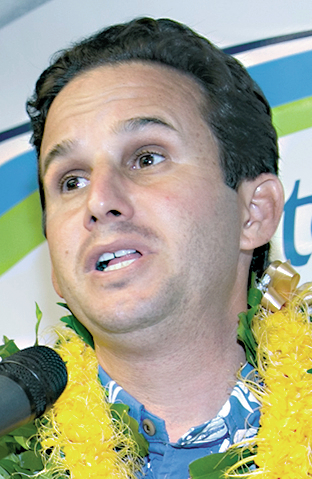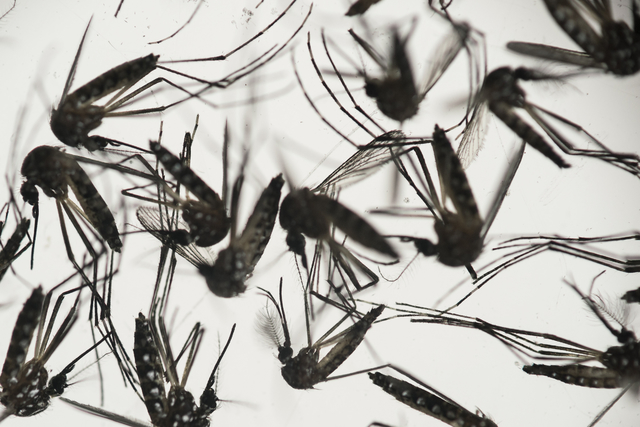Climate change may have fueled the outbreak of the mosquito-borne Zika virus in Latin American and may make it harder for developing countries to manage future epidemics, researchers said Friday. ADVERTISING Climate change may have fueled the outbreak of the
Climate change may have fueled the outbreak of the mosquito-borne Zika virus in Latin American and may make it harder for developing countries to manage future epidemics, researchers said Friday.
The finding was released on the same day that dozens of U.S. Senate Democrats urged President Barack Obama to take action to prevent an outbreak in the United States, including Hawaii, where the Big Island is already battling dengue fever.
As of Friday afternoon, the confirmed dengue fever case count for Hawaii Island stood at 250.
“As the dengue outbreak continues to impact communities on Hawaii Island, we need more aggressive action to contain it and to stop the threat of Zika, another mosquito-borne virus that is devastating dozens of countries around the world,” said Hawaii Sen. Brian Schatz in a prepared statement. “By increasing funding for critical government research and response programs, we can make real progress toward mitigating the impact of the Zika virus abroad and preventing its spread to Hawaii and the United States.”
Record-high temperatures last year in Brazil, Ecuador and other South America countries created ideal conditions for the mosquito that transmits Zika, which is suspected of causing birth defects, scientists said.
The researchers, who cautioned any link between Zika and global warming remains unproven, said violent storms, floods and drought are prone to fostering the outbreak and spread of diseases, particularly in underdeveloped nations. In addition to creating conditions where viruses can thrive, extreme weather can hobble already over-taxed public health systems.
“Unless mitigated, climate change is likely to bring the spread of new emergent infectious diseases like Zika virus,” Nick Watts, who leads a commission on health and climate change for the medical journal The Lancet, said.
Rising temperatures and increased rainfall can extend the geographic range and enrich breeding areas of mosquitoes, ticks, fleas and other insects that transmit diseases, scientists said. The pathogens they carry tend to become more resilient at higher temperatures and go through their lifecycles faster.
Warming “is posing risks for the transmission of vector-borne and other diseases,” said Diarmid Campbell-Lendrum, the World Health Organization’s climate change and health team leader, said in an interview.
In a 2014 report issued by the University of Hawaii School of Ocean and Earth and Science and Technology, global warning threatened Hawaii with the possibility of increased heat-related illness and wider ranges of vector-borne diseases such as dengue fever, among other issues.
“Some vector-borne diseases, such as dengue fever spread by mosquitoes, are correlated with wet, warm conditions because of increased availability of stagnant water and shorter incubation periods for vectors. In 2001 and 2002, Maui experienced an outbreak of dengue fever during a period of warmer and wetter conditions,” the study said.
In an effort to ensure the disease is contained and to prevent outbreaks in the United States and Hawaii, Schatz, along with 45 other Senate democrats, urged Obama in a letter on Friday to take “robust aggressive actions” via a coordinate interagency response plan to address the spread of the Zika virus.
“In the Americas, it is anticipated that the outbreak could infect up to 4 million people. Because Zika is carried by low-moisture dwelling mosquitoes, local transmission is predicted to spread to all countries and territories where the Aedes aegypti is found, including the United States,” the letter reads.
The letter calls for the president to take a number of new actions, including considering the Zika virus as the administration coordinates, and allocates resources in the Consolidated Appropriations Act for fiscal year 2016, and moves forward with the president’s 2017 budget request, or subsequent amendments.
It also urges Obama to develop a coordinate interagency response plan to address the virus at home and abroad, among other requests.
Meanwhile, in the state Legislature, a 2015 bill was carried over to the 2016 session calling for the creation of a climate change and health working group to examine various potential health impacts of climate change and assist Hawaii’s health professionals in effectively and efficiently preparing for and responding to the various potential health impacts.
Senate Bill 882, introduced by seven state Senators including Lorraine Inouye (Hilo, Hamakua, Kohala, Waimea, Waikoloa, and Kona), has been referred to the Water, Land, and Agriculture; Economic Development, Environment, and Technology; Commerce, Consumer Protection, and Health; and Ways and Means committees, however, it has yet to be scheduled for reading this session. A companion bill, House Bill 591, was also carried over, however, it had not yet been referred to committee as of Friday.
West Hawaii Today staff member Chelsea Jensen contributed to this report.






